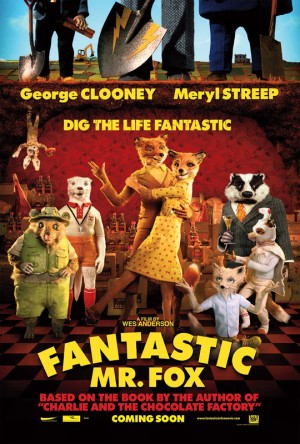
Bear with me here–remember that Limp Bizkit song where Fred Durst says the word “fuck” over and over and then counts up how many times he’s said it? I feel a little like Durst right now; I just realized that I use the word “Anderson” thirteen times in this review.
I can’t help it. Like Hal Hartley or Quentin Tarantino, Wes Anderson has made his name by cultivating a distinctive, unique style that permeates every frame of his films, and those films often end up revolving less around their plots or characters than around their individual director’s sensibility–specifically, in Anderson’s case, a sense of antique artificiality. Shots are constructed as neatly framed tableaux, the production design consists of retro pastels, and the cast performs in muted monotones. It’s an approach that’s earned Anderson a lot of fans, but if you didn’t like it in Rushmore eleven years ago, you won’t like it now either.
Still, Fantastic Mr. Fox (based on the Roald Dahl book of the same name) is one of Anderson’s most accessible films, mainly because animation, which always involves some artificiality by design, brings out the playfulness in the director’s technique. The story, which centers around the titular family man fox (George Clooney) swiping food from local farmers and trying to evade their clumsy retribution, serves as a jumping-off point for various inventive fight scenes, chase sequences, and even musical numbers. (Although there is one plot-summarizing song that was clearly only included for the sake of giving indie darling Jarvis Cocker a part in the film.) Filmmakers learned long ago that, for whatever reason, watching talking animals run around making fools of themselves is a lot of fun, and in that department Fantastic Mr. Fox does not disappoint.
Also, the script, by Anderson and collaborator Noah Baumbach (Kicking and Screaming, The Squid and the Whale) provides sympathetic characters and intriguing subplots, from Mr. Fox’s dissatisfied wife (Meryl Streep) to his talented but introverted nephew Kristofferson (Anderson’s brother Eric Chase Anderson). Despite the title, this is an ensemble film, and pretty much every character gets to have their spotlight moment.
Nevertheless, the weaknesses of Anderson’s approach haven’t been entirely overcome. In early films like Bottle Rocket and Rushmore an aesthetic sense of playacting dovetailed nicely with the deluded fantasies of the protagonists, but in later films like The Life Aquatic (nope, not a fan, sorry) Anderson’s technique came to seem more reflexive than purposeful. Again, Fantastic Mr. Fox‘s animated form and over-the-top content justify a degree of artificiality, but the characters are still distanced from the audience to an extent that seems unnecessary. For example, the film’s throwback visual style is charming, but the characters’ faces are static and inexpressive; happy or sad, angry or calm, they always seem to be fixed with blank, glazed-over stares. (And I’m not just referring to Kylie, an opossum whose eyes frequently and hilariously turn into eerie spirals.) Anderson seems to want to have his cake (as in, a family-friendly kids’ movie) and eat it too (as in, let the critics know he’s being ironic and post-modern).
Nevertheless, most audiences will probably be able to enjoy the film’s amusing adventures without being too distracted by the intellectual posturing, and in that sense, this is one of Anderson’s better works.
Anderson.
